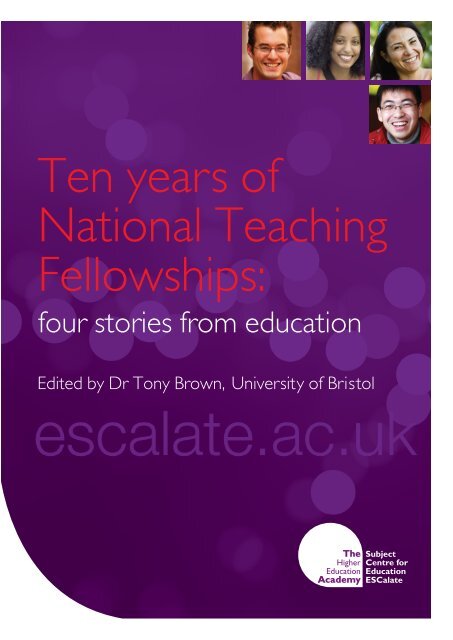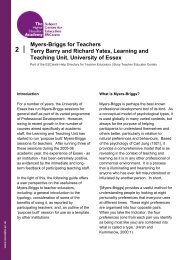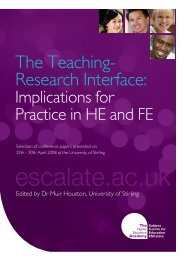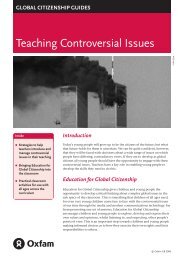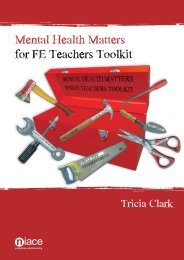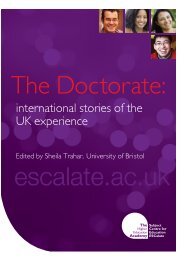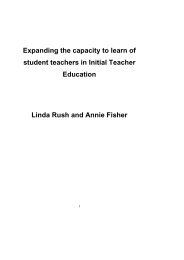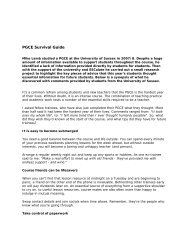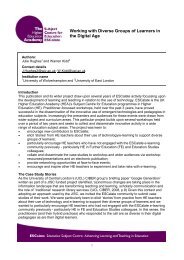pdf 4.2MB - ESCalate
pdf 4.2MB - ESCalate
pdf 4.2MB - ESCalate
Create successful ePaper yourself
Turn your PDF publications into a flip-book with our unique Google optimized e-Paper software.
Published by<strong>ESCalate</strong>HEA Subject Centre for EducationUniversity of BristolGraduate School of Education35 Berkeley SquareBristolBS8 1JAEmail: heacademy-escalate@bristol.ac.ukwww.escalate.ac.uk© Dr Tony Brown and <strong>ESCalate</strong> April 2011<strong>ESCalate</strong> production team - Dr Fiona Hyland and Teresa NurserPermission is granted to copy and distribute this document in unalteredform only, for the purposes of teaching, research, private study, criticism andreview, provided that the original author and publisher is acknowledged.The views expressed in this publication are those of the authors and do notnecessarily represent those of <strong>ESCalate</strong>.
Ten years ofNational TeachingFellowships:four stories from educationDr Tony BrownVisiting Fellow, University of Bristoltony.brown@bristol.ac.ukDISCUSSIONS IN EDUCATION SERIES
ContentsForeword 4Tony Brown (Visiting Fellow, University of Bristol)Introduction 6David Sadler (National Teaching Fellow, 2005)With love and anger 9Elizabeth Chapman Hoult (National Teaching Fellow, 2004)What do we stand for in teacher education? 13Des Hewitt (National Teaching Fellow, 2009)Listening, nurturing, and pulling: 17a passion to teach with careCaroline Walker-Gleaves (National Teaching Fellow, 2001)A teaching journey 21David Watson (National Teaching Fellow, 2008)3
DISCUSSIONS IN EDUCATION SERIESForewordCreating a national scheme, the NationalTeaching Fellowship Scheme (NTFS) thatrecognises and rewards teaching excellence,marked a significant policy shift in highereducation (HE) in England, around ten years ago.The competition has remained fierce, with atough grading scheme applied fairly butruthlessly to all applications that meet thescheme’s requirements and which go forwardfor consideration. The original award of £50 000for individuals meant a significant change incircumstances for individual award holders, manyof whom used the award to support researchand travel. The reduction of individual awards, in2006, to £10 000 has lessened opportunities forindividual award holders to travel and expandtheir international perspective on teaching andlearning – this at a time when HE needs a moreinternational perspective but when universities inthe UK risk becoming more insular, and wheresurvival and damage limitation are threatening todominate policy and practice.Staff in the education discipline were underrepresentedin the early years of the scheme. Inrecent years the proportion of Fellows fromwithin the discipline of education has steadilyincreased, although those teachingundergraduate level studies in further education(HE in FE) have struggled to gain Fellowships.The increasing numbers of award holders withan education specialism led to a decision in 2008by <strong>ESCalate</strong> staff to review the way it profilesFellows. This is a sensitive area. The award andrecognition are a personal acknowledgement ofexcellence. There is no requirement on Fellowsto do more, subsequent to receiving theiraward. Nevertheless, invitations by <strong>ESCalate</strong> toindividual Fellows to provide contact details anda public statement of their interests met withvery positive responses. Unsurprisingly, mostFellows are enthusiastic about sharing theirideas, and wish to promote excellence inteaching and research into student learning.4
TEN YEARS OF NATIONAL TEACHING FELLOWSHIPS: FOUR STORIES FROM EDUCATION<strong>ESCalate</strong> has built up a database of Fellows withexpertise in Education (http://escalate.ac.uk/ntf),a valuable resource for colleagues from which togain ideas and develop practice.In 2010 <strong>ESCalate</strong> staff took the decision to invitea small group of Education-based Fellows toexpand on their experience, describe the impactof the fellowship on their professional lives, andshare their thoughts about learning and teaching.This resulting publication is part celebratory –both of the scheme and the individual Fellows –and part exploratory: an attempt to explore theimpact of the Fellowship process on theindividuals involved in ways that colleagueswithin education will find useful.The four Fellows who discuss their professionallives in this publication were encouraged towrite positively and fully about themselves –something of a cultural challenge for manyBritish people – and one which brought feelingsof embarrassment for some of the writers.We hope the publication serves to illustrate thehuge diversity of those who are successful andthe diverse trajectories that their professionallives have followed. If there is one message totake away from reading this publication, it is thatyou have to be outstanding as a teacher to besuccessful in the Fellowship competition, but youcan be outstanding in your own way.Tony BrownVisiting Fellow, University of BristolApril 20115
DISCUSSIONS IN EDUCATION SERIESIntroductionDavid Sadler, Pro Vice-Chancellor (Students and Education),University of TasmaniaI write as a National Teaching Fellow (NTF) as well assomeone who, in a former capacity as a Director ofthe Higher Education Academy (HEA), had oversightof the scheme and was previously involved in theconsultations to reduce the award from £50,000 to£10,000, and develop a project strand for institutionalbids. As I left the HEA, the NTF scheme wasreverting back to just the individual strand andadditionally engaging academics in Wales, who will bejoining those in England and Northern Ireland.My Introduction will track some of these changes byfocusing on the value of the NTF scheme at sectoral,institutional and individual levels. I start at theindividual level for like all fellows, I have my own‘story’ and my own ‘journey’. The four stories fromeducation below share the traits that can be said totypify the experience of being a NTF. The passionwhich infuses these stories is palpable and is clearlylinked to the process of articulation and rearticulationof teaching philosophies that Walker-Gleaves identifies. This is one of the most positiveand enduring aspects of the rigorous nomination andapplication process. This was the first step in my ownpersonal transformation and was a genuine epiphany,in the sense of suddenly finding a confidence and avoice for my own approach to teaching.For many NTFs, the sense of being in ChapmanHoult’s words, a ‘free radical’, in the midst of oftenunsettling change in higher education, is anotherrecognisable element. Hewitt’s writing picks up onthis thread too. I will comment below on the sectoralimpact of NTFs, as distinct from the NTF scheme, butI contend they have greater potential as a collectiveforce of policy critique than has been hithertorealised. The collective combination of passion,expertise and experience in the NTF communitycould be a greater force for change than currently,where the navigation of the waters of change is oftena highly individualised experience. But this is to jumpahead of myself. Turning back to the individual level,Tony Brown laments in his foreword the drop infunding in 2006 as limiting the opportunities forinternational networking and travel. I do not dissentfrom this and as a recipient of the larger sum I haveused the money to broaden my perspectives beyondthe UK shores and outside the boundaries of my own6
TEN YEARS OF NATIONAL TEACHING FELLOWSHIPS: FOUR STORIES FROM EDUCATIONdiscipline. Ultimately, this has led me to a job literallyon the other side of the world, where I now have theluxury of experimenting with my philosophy oflearning and teaching across a whole institution. But adifferent argument that was a factor in the changedsystem was to spare the NTFs after 2006 from therequirement to complete and be accountable for amajor project. I know this was both an opportunityfor some and a hurdle for others, especially thosecombining the NTF project with many othercommitments.Walker-Gleaves notes how her NTF supported herPhD. National Teaching Fellowships have been usedfor professional development in many instances.Together with the capacity to build networks atnational and international level, this has led to CVenhancement and new career opportunities forindividuals. This must be balanced by the recognitionthat for some Fellows, the award has not beenbeneficial – with them being labelled ‘teachers’ in anenvironment that privileges research.My own experience of working with seniorinstitutional leaders, including those in the researchintensiveuniversities, leads me to the conclusion thatthis is not so often a problem at the institutional level,but rather a problem with the local culture in schoolsand faculties. Institutional enthusiasm for the NTFscheme can be measured in many ways including thedisappointment expressed by Pro-vice Chancellorsafter receipt of the news of unsuccessful nominations.More positively, the NTF scheme has helped to raisethe profile of learning and teaching and providedelements of an infrastructure and some criteriathrough which it may be rewarded. For example, ithas led to the development of institutional internalawards and fellowships for teaching, both as a steptowards NTF nomination and to address local ideasfor innovation. The project (group) awards weredesigned to address institutional agendas for changein learning and teaching and have led to someinteresting projects. In these straitened times, thesebecame an obvious target for cuts. As funds forteaching are cut in institutions, I question the wisdomof losing this institutional strand.At sectoral level the NTF scheme has been seen aspart of an overall architecture of support for learningand teaching that embraced Centres of Excellence inTeaching and Learning, the HEA including the subjectcentres and much else. In fairness, it should be notedthat there has been some scepticism over thecapacity of relying on individuals to effect widerchange and on the possible divisiveness of singling outindividuals. These and other reservations haveprevented the scheme operating in Scotland, but theextension to Wales is a major step forward.There is no doubt that the NTF scheme has changedover time – initially having separate categories for‘rising stars’, support and senior staff for example.There is just one category now and some concern inthe sector that the winners are increasingly at seniorlevels. This can be read in divergent ways as both aweakness of the current scheme and a testimony toits increasing currency. What is clear is that there issufficient political interest in celebrating excellenceand determination to show that there is investmentin an excellent student experience that the NTFscheme endures without serious challenge – I hope Iam not tempting fate!I close by returning to the individual level of analysis.David Watson presented me with my NTF award in2005. I did not realise how this fantastic night wasactually the cross-roads in my career. Like manyFellows, I became famous for five minutes, then used7
DISCUSSIONS IN EDUCATION SERIESby my institution to drive learning and teachingagendas across the whole university. I also developednetworks and friends from outside the university whoshared my interests more than those inside it. Myphilosophy around the student experience took meto the HEA. Ironically, I got further away from mydiscipline, from the practice of teaching and fromengagement with students that underpinned my NTFnomination – a process identified by Chapman Houltand indeed many others. By contrast, Watson speaksof the necessary relationship of academic leadershipand management to effective teaching and learning.My new role is an attempt to bridge these twoperspectives. This is my own story and journey, toadd to the four from education.8
TEN YEARS OF NATIONAL TEACHING FELLOWSHIPS: FOUR STORIES FROM EDUCATIONWith love and angerElizabeth Chapman Hoult, Faculty of Education,Canterbury Christ Church UniversityIn 2004 I was awarded a National TeachingFellowship (NTF). The award – £50 000 – and theopportunities that came along with it, expanded myuniverse considerably. Seven years later I feel like afree radical in a stagnant higher education systemwhere the primary instinct seems to be to retain thestatus quo even though decay appears inevitable. Iam charged with something that challenges all of that.The structures which held fast all the time thatuniversities received guaranteed public funding areproving un-resilient in these bleak economic andpolitical circumstances and as a sector we will have todo things differently, whether we like it or not. TheNTF has been a gift; it has given me a licence to beginto imagine an entirely different kind of university.My project has focused on how ‘non-traditional’ adultlearners negotiate their ways through a system thatappears to be set up to cater for the needs ofyounger learners from more advantagedbackgrounds. It seemed to me at the time that thewidening participation agenda, a core element of theNew Labour government’s HE policy, wasconcentrated too exclusively on young students andthat we needed to think more seriously about theseolder learners. Adult learners are particularlyinteresting to me because they refuse to conform towhat Bourdieu and Passeron (1979) call the‘educational mortality rate’, which increases thefurther down the social order we care to look. In sodoing they offer a serious challenge to the notion thatHE merely reproduces pre-existing levels ofadvantage and disadvantage. These learners, by theirvery nature, have resisted the social script set out forthem.My own experience of attending a Russell Groupuniversity as an 18 year-old provided me with a richsource of inspiration for thinking about HE as areproductive project. The fish fingers and slotmachines of my childhood in a working-class seasidetown were very different from the gymkhanas andholidays in the Dordogne of my peers. EnglishLiterature – my degree subject – had offered me apowerful alternative to the grim realities of the steelworks, the dockyard and The Sun in my hometown.But at university the work of Lawrence, Eliot andMilton were reduced to the sort of urbane analysisthat would prepare students for a lifetime of dinnerparties, rather than a social revolution. I hated the lazy9
DISCUSSIONS IN EDUCATION SERIESself-assurance of the upper middle classes and theway this confused privilege with ability. Even though Ihad great experiences at other universities where Iwent on to do post-graduate work, that enduringmemory of the university’s collusion with elitism andcomplacency stayed with me. My application for theNTF was driven as much by unresolved anger aboutthe limitations of universities to adapt to a genuinelydiverse student body as a claim for excellence.Embedded in my NTF project was a PhD. Early on,the award allowed me to travel, gathering interviewdata from a range of particularly resilient adultlearners in HE institutions. I hadn’t got too far into theproject before I realised that the language andmethods of social science were limiting; the nuancedand rich descriptions of transformational learning thatkept arising in the interviews was strangled by codingsystems and thematic readings. Other importantperspectives on the effects of class and age onteaching and learning also seemed to be missing fromthe study. There may be nobody better than PierreBourdieu at providing the big picture of theinequalities involved in HE but there is nobody betterthan Willy Russell at showing what those challengesmean to the individual learner. I combined literaryand empirical data, not using the literary as decorativeaccessory, as some sociologists do, but taking dramaand fiction equally seriously as a representation ofreality.The work of French post-structuralist philosopher,Hélène Cixous (1975) and her revolutionary ideasabout the realm of the gift was a strong influence onmy thinking throughout the work. Her key idea that‘femininity’ (not to be confused with biologicalfemaleness) is a political, psychological, artistic andmystical force captivated me. Central to herargument is the case for gift-giving withoutexpectation of return. Such feminine gift-givingchallenges ‘masculine’ ways of understanding theworld in terms of hierarchy, property and binaries.The world of HE is, when read in her terms,extremely masculine. Institutions are arranged in stricthierarchical order according to their prestige which isbased on their histories, their wealth and, sadly, thelevels of pre-existing capital that their students bringwith them when they enrol. What Bourdieu andPasseron (1977) observed in the French HE systemin the middle of the twentieth century – that it isentirely reproductive of levels of social capital – is noless true of the UK HE system in the new millennium.And despite the huge advances in scholarship ofteaching and learning, knowledge is still regardedfundamentally in terms of property – to be ownedand sold (or ‘transferred’) and jealously guarded. Toreceive a gift in these circumstances has beensomething of a miracle.The PhD that grew out of my NTF won an award –the British Education Research Association award forthe best doctoral dissertation in 2010. The judgespraised the way it ‘took risks’ and ‘broke new ground’.I would not have been able to take those risks had itnot been for the NTF because it allowed me toescape the apparently safe structure of disciplinaryand institutional limits and to say original andprovocative things about teaching and learning. Thoseboundaried spaces protect the interests of those withvested interests in maintaining the status quo. Youneed courage if you are going to take them on. ‘Youneed to find a community,’ my PhD supervisor, DrJohn Moss, wisely observed when it became clearhow far I wanted to go in challenging the socialscience orthodoxies. The community that I foundwas not disciplinary, nor institutional, but was amongthe network of national teaching fellows. Among theNTF network, associated colleagues at the Higher10
TEN YEARS OF NATIONAL TEACHING FELLOWSHIPS: FOUR STORIES FROM EDUCATIONEducation Academy and the Subject Centres forEnglish and Education I found supportive, open andimaginative thinkers who did not think I was mad inwhat I was attempting to do and who were preparedto give me safe spaces in their institutions andpublications to try out my ideas with new audiences.The confidence I developed from speaking at HEAnational events and international equivalents atInternational Society for the Scholarship of Teachingand Learning gave me the confidence to speak aboutteaching and learning at much higher levels in theinstitution than I had previously encountered. I ledstaff development sessions and became accustomedto speaking at full staff conferences and leading crossuniversityworking groups.Perhaps as a result of this higher profile, in 2006 anopportunity arose that allowed me to take on auniversity-wide role in developing these ideasstrategically. I was promoted to the role of Directorof Regional Academic Development andrepositioned at the centre of the University, ratherthan in the Faculty of Education. I found myself atmeetings that were chaired by government ministersand working with senior managers from the other HEproviders in the region on common issues. In thissense I have been able to extend my influence topolitical circles and funding bodies as well as theacademic community. An example of this has beenthe South East Coastal Communities project (SECC)which I have jointly co-ordinated with my colleagueDr Stuart Ashenden from the University ofGreenwich. The idea behind SECC was thatuniversities ought to find ways of sharing theirintellectual capital with the communities in whichthey are placed, and in particular the communitieswho have traditionally benefited the least from thepublic funding of higher education. It has been amajor, £3m project which has incorporated nineuniversities. My involvement marked a major turningpoint in my career. It was the point at which myideals collided with the real politics of highereducation funding. A huge advantage of the projecthas been that it has allowed me to work withinspirational colleagues, such as the Community-University Partnership team at the University ofBrighton, who are impressive, not just because of theinnovative nature of their work but because of theirgenerous ways of working. Not everybody workswith such a clear understanding of the collectivegood, though, and understanding how to be toughand streetwise while staying true to a philosophicalcommitment to the gift has been a hard butnecessary lesson for me.I have spent much more time in the last three or fouryears with colleagues outside of the institution thanthose inside. I won other bids which allowed me towork in ways which broke down the barriersbetween the university and communities. A drawbackwas that, ironically, although I had more influence on11
TEN YEARS OF NATIONAL TEACHING FELLOWSHIPS: FOUR STORIES FROM EDUCATIONWhat do we stand for in teachereducation?Des Hewitt, Education and Social Science, University of DerbyFollowing publication of the education white paperThe importance of teaching (DfE 2010), many teachereducators like me have started to question theirposition. After all, not only will schools look different,but it also seems that the role of universities inteacher education will change if the proposals in thewhite paper are eventually implemented. Taken withthe proposals for changes in fees in the Brownereport into higher education (Browne, 2010), this alladds up to the biggest ever challenge for universityteacher educators.Our first reaction may be panic, anxiety and evenanger at the threats to the status quo. ‘Haven’t wejust worked so hard to gain an ‘outstanding’ grade inour recent OFSTED inspection?’ The years ofworking to build strong partnerships with schoolshave been difficult, but the goodwill is incredible.Universities are by no means perfect, but they havemade a major contribution to the development ofeducation in schools. ‘It doesn’t make sense todenude this very provision, at the point when itseems strongest.’I would like to argue that achieving the NationalTeaching Fellowship award in 2009 is the single mostimportant factor in helping me to adapt to and mouldthe circumstances in which we now find ourselves. Isee theory and practice as being inseparable inteacher education. I will explain this through thefollowing areas.Social justice through teacher educationWhilst it is all too easy to become transfixed by thedaily requirements of our own institutions and thewider sector of teacher education, I believe thatfundamentally our aspirations should centre onproviding all learners with the opportunity toexperience a meaningful and challenging educationfor its own sake and for the future. In short, ‘do goodwell’. ‘Always treat people decently’.Ten years ago, when I became a teacher educator,this was my answer to a student who wanted toknow the secret of being an effective teacher.13
DISCUSSIONS IN EDUCATION SERIESThis same principle has governed my own approachto the development of a strong and successfulprogramme of Initial Teacher Education.Excellence and social justice have been guiding lightsfor me in my journey from teacher educator toleader of a successful and influential team at theUniversity of Derby. Throughout, I have maintained acommitment to professional improvement whilst stillbeing true to the values which led me to join theprofession ten years ago. Importantly, as members ofthe Higher Education Academy (HEA) we have aduty to support each other in developing ourapproaches to teacher education. This duty exists at apersonal and institutional level. A commitment tosubject and professional bodies such as the HEA andthe Universities’ Council for the Education ofTeachers (UCET) should be central to our sense ofmutual support.The tone of the learning experience is as importantas the content. As teachers we model cognitivelearning strategies, social skills, emotional resilience inintellectual endeavour and social responsibility. That iswhy treating students with decency and humanityshould be central to how we approach teaching:‘Every time we learn something, we learnsomething about learning.’ (Claxton, 1990)My teaching approach is centred on self-regulatedlearning and understanding the power of learningstrategies. Reading about the possibility of teachinglearning strategies for self-regulated learning inPalinscar and Brown (1984) was an epiphany for me.Their work has become a theoretical driving force formy research and teaching. My own experience as ateacher suggested that learning (in schools and atuniversity) can be thrillingly engaging or passive andtedious. This was in part informed by my research toexplore the experience of learners in teachereducation:■ The assessment lives of student teachers.Teaching inspired research project, University ofDerby, 2006.■ The development of teacher reflection onplacement. <strong>ESCalate</strong> workshop, 2007.■ The power of the tutorial. Teaching inspiredresearch project, University of Derby, 2008.■ Professional resilience in student teachers.Research inspired curriculum grant project,University of Derby, 2009.When students pay higher fees to study, the qualityof their learning experience will be an even moresignificant factor in their choice of where to study.Research into learning and teaching in school anduniversities will provide the insight and foundationsupon which improvement and adaptation to changingcircumstances are built, for example by rationalisingthe student experience of assessment, more centredon and regulated by the student. The seminar is apowerful mediating tool for formative assessment14
DISCUSSIONS IN EDUCATION SERIESschools are already involved in ‘Professional LearningCommunities’. Whilst the opportunities for trainingfrom Local Authority advisers and consultants may bemore limited in light of the Comprehensive SpendingReview (2010), University Training Schools may evenstrengthen such communities of practice. Theultimate guiding light should be the quality of learningexperience and outcomes of learning for children(and consequently for adults). If there has been adifficulty in recruiting schools to existing initial teachereducation partnerships, it could be that there hasbeen an insufficient focus on the impact on children’slearning of initial teacher education.Together schools and universities can work togetherfor the common good of children and all learners.There is uncertainty, but there is also great potentialfor the future. Courage, principle and collaborationare the way ahead for teacher education.ReferencesBlack, P. and Wiliam, D. (1998) Assessment and classroomlearning. Assessment in Education: Principles, Policy andPractice, 5 (1), 7-74.Browne, J. (2010) Independent review into higher educationfunding and student finance. Securing a sustainable future forhigher education. London: HMSO.Claxton, G. (1990) Teaching to learn. London: Cassell.DfE (2010) The importance of teaching: schools white paper.London: HMSO.HM Treasury (2010) Spending Review 2010. London:The Stationery Office. http://cdn.hm-treasury.gov.uk/sr2010_completereport.<strong>pdf</strong> [accessed 16 March 2011]Palinscar, A.S. and Brown, A.L. (1984) Reciprocal teachingof comprehension-fostering and comprehensionmonitoringactivities. Cognition and Instruction, 1, 117-175.16
TEN YEARS OF NATIONAL TEACHING FELLOWSHIPS: FOUR STORIES FROM EDUCATIONListening, nurturing, and pulling:a passion to teach with careCaroline Walker-Gleaves, School of Education, Durham UniversityTen years after winning a National TeachingFellowship whilst teaching at Sunderland University Ican look back and say it was a profound turning pointin my career in higher education. Born of urbanindustrial development in the early twentieth century,Sunderland University is a mid-size urban institutionof the North East of England, which has served theneeds of an increasingly local community since the1970s. Known nationally for its pioneering work inincreasing access to education within deprivedcommunities, the student body has a very significantwhite, working class adult and part-time studentpopulation, mainly composed of individuals who arethe first in their families to study in HE. Thesecharacteristics describe me well – a white workingclass woman, born and raised in a deprived urbancommunity, the first generation in my family to attenduniversity, and who had studied part-time for manyyears, amassing qualifications that I hoped one daywould assure me entry to the ranks of ‘universitylecturer’. When I first became a lecturer atSunderland University in 1999 I was confronted bythese similarities, as well as by some differences,between many of the teaching staff and me anddetermined to understand these whilst getting toknow this community of which I had become a part.In this effort, during the first year of my appointment,I laid out – metaphorically – my ‘teaching stall’ in theform of structures, timetables, course materials andnot least, relationships that I envisaged would formthe basis of my work as a HE teacher. Being in manyways strikingly similar to the students whom I wasteaching, I came to understand that the university’smaxim ‘Sunderland is life-changing’ should happen ata relational level, through provoking a student into arisky argument in an essay; or handing work back justone more time with writing scrawled all over it; orplanning a seminar around students’ experiencesrather than abstract concepts. I took this mission toheart, hoping to change lives through individualinteractions of learning. Buoyed by the enthusiasmand increasingly adventurous work that studentswere handing in, and validated by the affirmative andencouraging comments from external examiners, Ispent more and more time organising my classesdifferently in time, space and content, and began tosubmit substantially altered module guides to theQuality Committee. To my surprise, I came to thenotice of my department’s staff: some were deeplysuspicious of what I must be doing, stating that as a‘university lecturer’ I could not justify spending somuch time with students. Others were concerned by17
DISCUSSIONS IN EDUCATION SERIESmy compulsive need to make such terrifyingdemands on students who had never studied before.Others were simply bemused by the large numbersof presents I received at the end of every semester,almost always with the same message – ‘thank youfor forcing me to be better than I thought I was’.When it came to nominating a faculty member forconsideration for the University’s applicationprocedure, I think that one reason they chose mewas the sheer volume of flowers that arrived at theSchool of Education reception every term!paradox at the heart of my work: the university’sespoused mission was to change lives, and learningseemed to resonate with the notion that thestudents’ acceptance to study at university was at thecentre of all our work. But in this relentless focusupon being ‘life changing’ of the actual livedexperience of the students – their individual hopes,aspirations, triumphs – seemed to be cast intoshadow. For me personally it seemed as if we hadsomehow put aside what I saw as our centralpurpose to change one life at a time.In truth though, it was the flowers – and themessages – that made me decide not only that Icould engage with the National Teaching Fellowships,but also that I was demonstrating something original– excellence perhaps – in my work that was making aprofound difference to these students. When I joinedthe University I was what Hoyle (1975) would call a‘restricted’ professional in that my focus of teachingwas mainly on educational outcomes as a function ofclassroom behaviours. Hoyle and many others sincehave used this term critically when comparing it with‘extended professionalism’ that, they argue, takes amore sophisticated account of pedagogy, predicatedmultiply on context and collegiality as well. But it wasthis notion of the restricted professional thatcontributed to my eventual pedagogy and what forme, has contributed to a much deeper understandingof student learning. For me, there seemed to be aIn 2000, a year after I had commenced myemployment at the university, I began to understandand to question deeply for the first time, the receivedwisdom that being a so-called ‘extended’ professionalgave one a clearer view of pedagogy. I began carefullyto examine the possibility that being a ‘restricted’professional would allow me the freedom toexperiment with new forms of pedagogic relationshipthat put centre stage, students’ ‘lived experiences’ oflearning. It was these ideas that informed my workand that I sought to recount and describe in myNational Teaching Fellowship application. Although Ihave always found the idea of engaging in anythingthat is both public and competitive frankly terrifying, itis ironic that the reasons I was able to apply at allwere the contradictions and inconsistencies in myown background. At Sunderland I was bothcomforted by the familiarity of the students’18
TEN YEARS OF NATIONAL TEACHING FELLOWSHIPS: FOUR STORIES FROM EDUCATIONbackgrounds and the dual conflict of aiming lowbecause of dulled expectations, yet aiming at allbecause of fervent aspirations. I took this philosophywith me when I wrote my final application, after I hadbeen selected as the University’s candidate.I won a National Teaching Fellowship in 2001, and itgave me the courage and voice to argue tentativelythat this ‘restricted’ view of pedagogy could actuallybe re-stated as a purposeful pedagogy that placedrelationships and the ‘in between space’ centre stagein understanding students’ learning. The money that Iwon allowed me to take some time away fromteaching, and to travel to universities around the UKwhere I discussed my ideas on relational approachesto teaching. I have written many papers pursuing thephilosophy of relationships, throughout, seeking toexplore the impact on education of more progressiveand personal interpretations of learner-centredness.But still, although I had won the award, because I hadno other point of reference I assumed that what itreally meant to be a university lecturer from mybackground was to be forever ‘restricted’ and seek toenhance learning only through a focus on narrowbehaviours prescribed by the missions of learnercentrednessand responsiveness. I had not realisedthat I was allowed to clarify for myself what thismeant in practice, exploring as I went alongassumptions about what ‘learner-centredness’ actuallymeant. Although it took time, it slowly dawned onme that attention to all elements of my teaching wasindeed being ‘learner-centred’, and moreover, thatmy learner-centredness was encapsulated in thebeliefs and practices of ‘caring teaching’.Such revelations were predicated upon my readingaround the experiences of the students whom Itaught, centred upon a localised and empoweringinterpretation of teaching, drawing on the work ofBelenky et al (1986) on narratives ofunderrepresented groups, but also, critically, on thework of Carol Gilligan and Nel Noddings. I had cometo be interested in the work of these latter twowriters because they clarified for me the complexdichotomy within my teaching: an ambivalencetoward the existing curriculum structures thatseemed to govern all aspects of the university’steaching and a compulsion to make a reality of theuniversity mission to be ‘life changing’, no matterwhat it took. Gilligan and Noddings seemed to offerme that possibility: Carol Gilligan through hertheorisation of a ‘relational justice’ that validatedindividually negotiated experiences of learning andNel Noddings through her theorisation of caringrelational zones with the emphasis on motivationaldisplacement and engrossment.Using Noddings’ and Gilligan’s writings I came torealise that the dimensions in my teaching which I hadnot explored before were predicated upon my ownautobiography. Step by step I took Gilligan andNoddings as my guides and ‘translated’ critical19
DISCUSSIONS IN EDUCATION SERIESelements of my work into relational and caringteaching. I changed taught classes into a series ofsmall seminars so that I could explore ‘cognitive andemotional engrossment’; I changed assignmentdeadlines into early hand-ins and last-chances so Icould try out relational justice in assessment; Ichanged module teaching into experiences andpractice sessions so I could try out fidelity andcognitive consonance.All of these interactions, all of the experiences I havedescribed, have taken place over the last decade.Whilst the financial reward of the National TeachingFellowship gave me the freedom and yes – credibility– to speak and to be listened to, it has ultimatelybeen the act of reflection that I feel has made me abetter, more insightful teacher. That initial writing ofthat essay to ‘claim’ my excellence was the startingpoint in my explaining my interest in understandingthe contexts from which my students come and theexperiences that continue to shape them as learnersand future teachers. Then the constant reflections onwhy I won the award in the first place have led me toexamine my own context and experiences and todecide that affecting the wider community ofteachers – becoming ‘extended’ – is not moreimportant than remaining ‘restricted’: it’s just asimportant. Although ‘Changing Lives’ was my story, Ihad never assembled it before in a cohesive narrativeform either for myself or for others. The NationalTeaching Fellowship allowed me to do this, andthrough its composition, I have been able to glimpsehitherto unseen patterns and unacknowledgedrelationships between my own learning experiencesand my teaching practices, thus making connectionsbetween myself as a learner and as a teacher.ReferencesHoyle, E. (1975) Professionality, professionalism andcontrol in teaching. In V. Houghton et al. (Eds) Managementin education: the management of organisations and individuals.London: Ward Lock Educational in association with OpenUniversity Press.Belenky, M.F., Clinchy, B.M., Goldberger N.R., and Tarule,J.M. (1986) Women’s ways of knowing. NY: Basic Books.20
TEN YEARS OF NATIONAL TEACHING FELLOWSHIPS: FOUR STORIES FROM EDUCATIONA teaching journeyDavid Watson, Principal, Green Templeton College, OxfordI have been asked to reflect on my experience as ateacher in higher education, and why the NationalTeaching Fellowship is important to me. For a littlewhile I may keep my status as a pub quiz question:who is the only former Vice-Chancellor to be aNational Teaching Fellow? When I lose thatdistinction I may last a little longer through thecorollary: who is the only former Chair of theAdvisory (Selection) Committee to become aFellow? From this I hope it comes across that I amvery proud of my Fellowship and what it represents.In 2006 I was privileged to be invited to present thenewly inaugurated Teaching Awards at the Universityof Oxford. I concluded my introductory speech asfollows:“After many years in the business I remainconvinced that being an effective teacher ishigh up the list of intangible benefits thatattract bright women and men intoacademic careers. Events like this evening’smean that for many it is still the feature thatgives them most satisfaction. Some people inand around higher education would quarrelwith this view. They believe, for example, that(in the words of Lord May, President of theRoyal Society) success in the ResearchAssessment Exercise is “the only game intown,” or that commercial exploitation ofuniversity-based knowledge is the path topersonal as well as institutional enrichment. Ithink that they are wrong.”In 2010 I attended this ceremony again, as a Head ofHouse. My career has almost come full circle: my firstmajor job in UK HE was as a course leader in aninterdisciplinary field, as was my role when I wasawarded my Fellowship. In addition, and during thecourse of this career, I have played other relevantroles: as a senior manager, as the head of twoinstitutions (one large, and one very small), and as acontributor to a number of national and internationalagencies and initiatives (Watson, 2007a, 2007b).My disciplinary background is as an historian, and Ihave been an active teacher and researcher in thehistory of ideas. I am proud of my published work inthis area, including my books on the American21
DISCUSSIONS IN EDUCATION SERIESphilosophers Margaret Fuller published in 1988 andHannah Arendt published in 1992. However, I havemoved significantly over time to apply this disciplinarytraining and experience to HE policy and practice,including pedagogy (Watson, 2008).Although I come from a line of school teachers (mygrandfather taught science and my father languages instate secondary schools), I always knew that I couldnever match them in terms of the patience andvicarious satisfactions it takes to be a really goodteacher in schools. I did, however, have someexperience at this level: as a gap-year teacher in JuliusNyerere’s wonderful experiment in ‘education forself-reliance’ in Tanzania in the momentous year of1967-68; immediately after graduating as a supplyteacher in North London (the last year when youwere regarded as qualified with just an Honoursdegree); and as a part-time teacher of music in aQuaker school in Philadelphia while I worked on myPhD (at the University of Pennsylvania, 1971-75). Butfrom when I was an undergraduate student in historyat Cambridge (1968-71) I knew I wanted to be ateacher in HE.In that respect I have basically had five jobs over 35years in five very different English institutions.Crewe and Alsager College of HigherEducation, Senior Lecturer then PrincipalLecturer in Humanities, 1975-81. These werethe heady days of public sector ‘diversification’,following the James report and the major cuts toteacher education. My key responsibility was thedevelopment of a new suite of courses in thehumanities.Oxford Polytechnic, Dean of the ModularCourse then Assistant Director (Academic),1981-90. I went to Oxford as the fourth Dean ofthe pioneering undergraduate Modular Course. Withcolleagues I was responsible for its re-design and revalidationfor its second decade. During my Deanshipthe course at least doubled in size on everydimension (see Watson, 1989; Bines and Watson,1992). I continued to teach throughout, withresponsibility for the compulsory final year historymodule ‘Theories of social change (4910)’.Brighton Polytechnic/University of Brighton,Director and Vice-Chancellor, 1990-2005.During my fifteen years as head of the polytechnicand university, the institution developed a substantialreputation for partnership work (for example, theestablishment of the Brighton & Sussex MedicalSchool), for innovation (for example, the annualLearning and Teaching conferences), and for civicengagement. Two of my books build substantiallyupon this experience (Watson, 2000, 2007b).Working with colleagues, I also continued my interestin professional formation (Bourner, Katz and Watson,2000).22
TEN YEARS OF NATIONAL TEACHING FELLOWSHIPS: FOUR STORIES FROM EDUCATIONInstitute of Education, University of London,Professor of Higher Education, 2005-10. Afterretiring from Brighton, I was appointed to theInstitute’s new chair of HE management. One of mymain responsibilities was as Course Director of theInstitute’s highly successful MBA in Higher EducationManagement, which began under the leadership ofProfessors Michael Shattock and Gareth Williams in2002 (Watson, 2009a).Green Templeton College, Oxford,Principal, 2010. Green Templeton is formallyOxford’s newest College, formed in 2008 throughthe merger of Green College, with its strongtraditions in medicine, health, and education, andTempleton, the foundation stone of Oxford’s work inbusiness and management. It has approximately 500students, all post-graduate, and focuses on issues ofhuman welfare. One of my main tasks is to ensurethat the College adds value to their academicexperience.In addition to conventional teaching and researchsupervision I regard my developmental work withgroups across the sector in the UK and abroad as aform of teaching. I have found widespread interest onthe part of institutions and groups in the outcomes ofmy research and development activities on lifelonglearning, academic frameworks, professionalformation, widening participation, communityengagement, ethical standards in governance, andleadership and management (Watson and Taylor,1998; Schuller and Watson, 2009). It has also been aprivilege to serve on national and international bodiesseeking to improve higher education: the Council forNational Academic Awards; the Funding Councils;the ESRC Teaching and Learning Programme; theInstitute for Teaching and Learning (fore-runner ofthe Higher Education Academy); the Paul HamlynNational Commission on Education; and especiallythe Dearing Committee of Inquiry into HigherEducation (Watson and Amoah, 2007).This story may appear to some readers as moreabout management than about teaching and learningin HE. I would argue that it is not. Academicleadership and management is a necessary (but ofcourse not sufficient) condition of effective learningand teaching, especially in the complex relationshipsthat characterise higher education. I learned thislesson through meta-analysis of a substantial body ofevaluation work on the ‘natural experiment’ of theOxford Polytechnic Modular Course: studentsappreciated charismatic and inspirational teaching, butthey also needed sound organisation and trust in thesystem. Somewhat later I published with Jean Bocock(then of the union NATFHE): Managing the UniversityCurriculum: making common cause (Bocock andWatson, 1994). At that stage this was a highlycontroversial proposal, and Jean and I were attackedaccordingly. Subsequently, I would suggest, it hasbecome an orthodoxy, as well as a widely recognisedsource of professional obligation.23
DISCUSSIONS IN EDUCATION SERIESMy latest book is on university morale (Watson2009b). Why is so much discourse aboutcontemporary higher education structured around(real and imagined) unhappiness? What should we bedoing about it? Reflection on how and why we cameto be in the business is a good start at the answer.ReferencesBines, H. and Watson, D. (1992) Developing professionaleducation. Maidenhead: SRHE/Open University Press.Bocock, J. and Watson, D. (Eds) (1994) Managing theuniversity curriculum: making common cause. Maidenhead:SRHE/Open University Press.Bourner, T., Katz, T. and Watson, D. (2000) New directionsin professional higher education. Maidenhead: SRHE/OpenUniversity Press.Schuller, T. and Watson, D. (2009) Learning through life:report of the inquiry into the future of lifelong learning.Leicester: NIACE.Watson, D. (1989) Managing the modular course:perspectives from Oxford Polytechnic. Maidenhead:SRHE/Open University Press.Watson, D. (1990) Managing strategy. Maidenhead: OpenUniversity Press.Watson, D. (2007a) Academic identities and the story ofinstitutions. In R. Barnett and R. Di Napoli (Eds) Changingidentities in higher education, London: Routledge, p 175-81.Watson, D. (2007b) Managing civic and communityengagement. Maidenhead: Open University Press.Watson, D. (2008) Historical methods applied to highereducation polices and practices. London: TLRP.http://www.tlrp.org/capacity/rm/wt/watson [accessed 16March 2011]Watson, D. (2009a) Can we teach higher educationmanagement? In V. Bamber, P. Trowler, and M. SaundersEnhancing teaching and learning in higher education: theory,cases, practices. Maidenhead: Open University Press,p 113-120.Watson, D. (2009b) The question of morale; managinghappiness and unhappiness in university life. Maidenhead:McGraw-Hill/Open University Press.Watson, D. and Taylor, R. (1998) Lifelong learning and theuniversity. London: Falmer Press.Watson, D. and Amoah, M. (2007) The Dearing Report: tenyears on. London: Bedford Way Papers.24
Discussions in Education SeriesTen years of National Teaching Fellowships: four stories from educationISBN 978-1-907207-32-7 April 2011<strong>ESCalate</strong>University of BristolGraduate School of Education35 Berkeley SquareBristol BS8 1JA UKTel: 0117 331 4291Email: heacademy-escalate@bristol.ac.ukThis is one of a series of discussion papers commissioned for <strong>ESCalate</strong>, for more details see our website.


